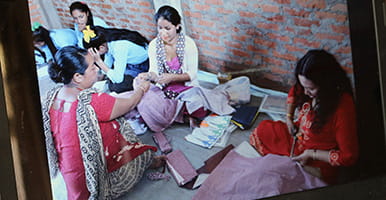Menstrual health research
Dr Kay Standing and Dr Sara Parker are currently completing a British Academy Small Grant Project on re-usable sanitary towel projects, assessing their wider impact on women's health and wellbeing in Nepal.
Project overview
This project aims to evaluate the impact of the use of reusable sanitary pads on improving women and girls’ wellbeing in Nepal. The distribution of sanitary pads and menstrual health management programmes (MHMP), are widely used amongst the NGO community as a means to improve reproductive health and wider social outcomes for girls, including increased school attendance. However, there is little academic evaluation of the impact of these initiatives in rural Nepal, especially in terms of social outcomes. The project will be an exploratory pilot study to begin to explore the social impact of MHMP on women and girls’ everyday lives. A mixed methods approach, using questionnaires, menstrual charts and focus groups will capture the impact of these initiatives and assess the nuances of girls’ experiences and observations of reusable pad programmes. The project will result in conference presentations, journal articles and reports to NGOs, adding to the growing body of academic work in this area.
Background
In Nepal, unhygienic menstrual hygiene practices have been linked to negative outcomes for women and girls in relation to reproductive health and social factors such as school attendance (Hennegan and Montgomery, 2016; Standing et al 2006). Taboos around menstruation are widespread (Standing et al, 2016), while basic understanding of menstrual hygiene is limited, especially in rural areas (Sapkota, 2013). The Chhaupadi system (banishing menstruating women from the household), although illegal since 2005, is still practiced in Far Eastern Nepal (Bahandaree et al 2013).
To address these problems, NGOs use MHMP to provide education on menstruation and reproductive health and to deliver reusable sanitary pads. Reusable pads are made from waterproof, antibacterial and antifungal material which can be cleaned with soap, creating a sustainable alternative to expensive (and often unobtainable) disposable pads. Bobel (2010) argues these are forms of menstrual activism which challenge taboos and improve women and girls’ education, and which promotes social and reproductive health outcomes. However, there is a paucity of empirical research assessing the effectiveness of such projects, particularly in the context of rural Nepal and across different types of communities. This project will be a pilot study to evaluate the work of NGOs delivering MHMP in Nepal, assessing their impact on girls’ education, health outcomes and wider social impacts.
Dr Sara Parker and Dr Kay Standing shared their preliminary findings at BNAC Conference in 2017. The pair are currently working on their final report. Please check back for details and follow them on Twitter using @LJMUSociology, @LJMUNepal and #menstrualhealth.
The release of the Bollywood film Pad Man has thrown the spotlight on periods – see Dr Kay Standing's response to this in The Independent newspaper.





